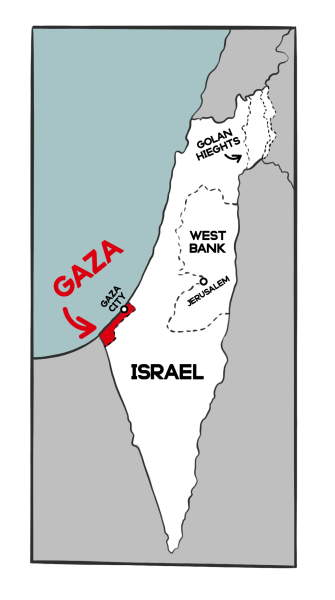
Jujube Hutt
During a Morning Meeting on Wed., Oct. 8, the Poly Upper School took a moment to commemorate the two-year anniversary of Hamas’s terrorist attack on Israel on Oct. 7, 2023, and the ongoing war in Gaza.
Hamas’s attack on Israel two years ago killed more than 1,200 people, and the subsequent Israeli bombings and military actions in Gaza have killed more than 65,000 people, according to Reuters.
Leaders of the Jewish Student Union, Middle Eastern Affinity Group, Muslim Student Association, Iranian Culture Club and Armenian Culture Club collaborated to prepare remarks that addressed the death toll of the conflict and its history.
“Events like October 7 are part of a complex historical pattern of political and sectarian tensions in the Middle East,” said junior Tara Parsa, who leads the Iranian Culture Club. “These events remind us how global conflicts affect communities far beyond the region, including refugee crises and waves of migration.”

The announcement was brief but deeply reflective, allowing students and faculty a moment to acknowledge the impact of this violence. The presentation stood as a solemn reminder of the lives lost during this conflict and the persisting tragedies that still occur today.
“It’s surprising that nothing much has been said by the administration for the past two years,” said senior Sofia Flores-Castro. “It’s slightly disappointing that it had to come from students and not Mr. Bracker.”
Following the announcement, students and faculty took a moment of silence to honor the victims on all sides of the conflict.
“Though the student response was good, it was lacking,” said Upper School Mathematics Teacher Jack Prater, “Students were participating, but it was clear they weren’t engaged. People were restless. It was appropriate for a high school, but we’ve been better as a community.”
Leader of the Middle Eastern Affinity Group, senior Zara Khan, reflected on the importance of the moment of silence: “On a campus with such diverse backgrounds and experiences, these gatherings allow students to confront perspectives and histories they might not otherwise encounter,” Khan shared.
“Seeing students across different affinity groups and organizations stand in solidarity and remembrance gave me hope,” said Upper School English Teacher Elsie Dang, “It’s so easy to stay ignorant and hopeless, so knowing that students are saying something and reacting gives me hope that action is possible.”